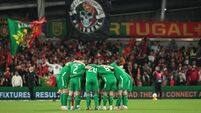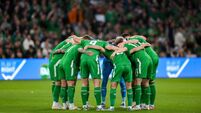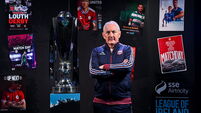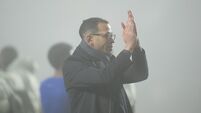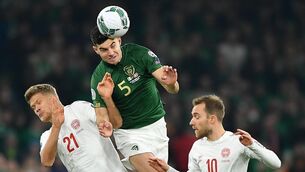John Fallon: Escape clause in Stephen Kenny contract shows new reality for FAI
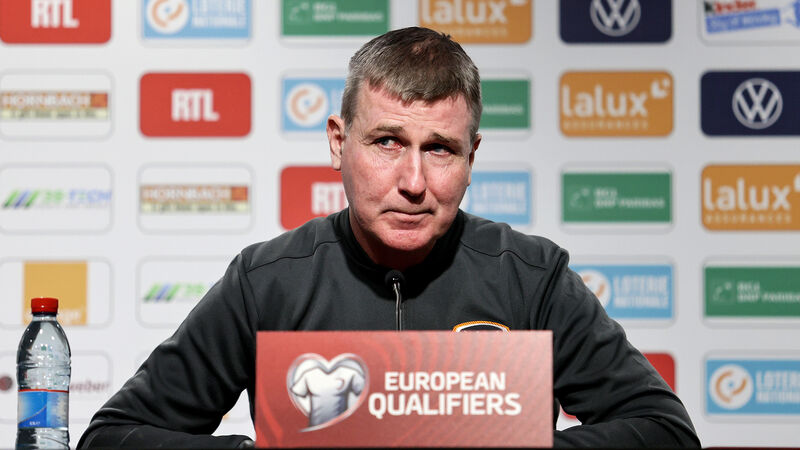
The last thing the FAI need in their pursuit of stability from a period of upheaval is another controversy, this time surrounding the manager’s future, writes John Fallon. Picture: INPHO/Laszlo Geczo
There’s nothing quite like a visit from a European superpower to kickstart a bout of pining for Ireland fans.
Unlike the bulkier staples such as France, Spain, and Italy, the success of Belgium is one we can resonate with.
A similar sized nation operating in the shadows of bigger neighbour, they have replicated Ireland’s feat from a bygone era of defying the demographics to thrive on the international stage. “If they can do it, why can’t Ireland?” will the predictable refrain when the contrast in squads magnifies the stature of leagues and clubs Roberto Martinez’s players operate at with regularity.
Belgium are just the latest example of best in class foes for Ireland — a narrative triggered by meetings with Croatia at Euro 2012 and, more recently, against a superior Serbian side — but the evidence suggests there’s no comparison.
Belgium plummeted from a nation who reached six successive World Cup finals to one without qualification for any showpiece between 2002 and 2014. It’s okay, they didn’t mind. Short-termism was outlawed for the sake of reverting to first principles and most of the managers that left the post as senior boss during the drought — such as Dick Advocaat and George Leekens — did so in order to accept what they deemed better offers. In the background, the country wedged between France and Germany favoured a bottom-up approach, laying the foundations in towns and cities to nurture what became their golden generation.
The first fruits were visible at the 2007 Euro U21 finals, where the team backboned by Thomas Vermaelen, Jan Vertonghen, Marouane Fellaini, and Axel Witsel reached the semi-finals. Younger blood soon emerged in the form of Eden Hazard, Thibaut Courtois, Kevin De Bruyne, Romelu Lukaku, and Yannick Carrasco, fusing to reach the top of Fifa’s rankings in 2018. All of it was 16 years in the making, stemming back to the root and branch review, centring on restoring Belgium’s identity and maximising those essential ingredients of leadership and investment.
Long-term visions are a rarity across Irish football, definitely versions carrying substance. Stephen Kenny did indulge in some of it last year but it only was only uttered in September when his back was against the wall, scrambling for a diversion from an abysmal World Cup qualifying campaign.
The Ireland manager began his reign 12 months earlier talking up the unprecedented year ahead congested with Nations League and World Cup qualifiers, sandwiched in between by a Euro 2020 playoff. At no point, until his press conference two days on from being held to a 1-1 draw by Azerbaijan, was the transitional rationale mentioned. Taking short-term pain is well and good so long as it’s not couched in double-speak.
Actions by Kenny’s employers also suggest a misalignment in outlook. The FAI’s strategy document, months in gestation and due to be unveiled shortly, is categorical about the targets for the men’s and women’s senior teams. “What we’re saying is we expect our senior international teams to be qualifying for every other (second) event,” explained FAI chief executive Jonathan Hill last July. “We know it’s more difficult in practical terms to qualify for Fifa events than Uefa events at the moment.
“It’s always the question asked in relation to an FA’s strategic division. You have to get the balance right between ambition and realism.”
That reality is underpinned by the financial imperative. Qualification constitutes the primary revenue stream for those associations Hill refers to, a vital source of income to service the FAI’s debt pile of €65m. The gap in major tournament appearances will widen to a minimum of eight years for Euro 2024 but the association are hedging when it comes to deciding who the best man is to get them to Germany. Cash is king and never before has the fortunes of the senior team been so integral to their ability to fund other aspects of the game.
Soon, the multimillion life-raft of Covid-19 rescue funding from the state will be no more and while belated Government support will play a role in certain areas, creating turnover through their own means is the only show in town.
That starts by attracting a main sponsor for Kenny’s team, filling the €3m per annum hole left by Three’s departure in 2020. Hence it was interesting to hear Hill highlight the “messaging” attached to granting Kenny a new contract beyond the current deal lapsing in July. The last thing the FAI need in their pursuit of stability from a period of upheaval is another controversy, this time surrounding the manager’s future.
Big brands trade on consistency and the minimum of disruption through their advertising and promotional campaigns. Although that will aid delivering a commercial partner this year, it won’t deter the FAI from changing manager should doubts creep into their broader and more lucrative target of qualification. Kenny’s contract extension, covering the Euro campaign, will contain a clause facilitating a premature severance after the Nations League campaign in September at a manageable cost. The era of seven-figure payoffs to Martin O’Neill and Mick McCarthy has been consigned to history.
Still, for the time being, it will be all smiles and forward-facing, both parties likeminded in a determination to avoid the fallback option. Facing the standard bearers of long-term thinking in March will only underscore how distant Irish football is from that mindset.
No sign of end to hostilities between Rovers and Bohs
Squabbles between rival football clubs can be tiresome but the antics of Bohemians and Shamrock Rovers continues to entertain.
No sooner had Bohs gone full into full public relations overdrive about their delayed Bob Marley-inspired away kit — kickstarted with a preordained package on RTÉ’s Morning Ireland — than their Dublin nemesis retaliated. Rovers boss Stephen Bradley admitted their capture of Bohs full-back Andy Lyons had been completed over the weekend but they waited just in time for the lunchtime slot to unveil the free agent’s signing, thereby relegating Bohs to the undercard. “Andy wanted to be with a team that is winning and competing for things,” gloated league-winning gaffer Bradser. Ouch!
Relations were never more than civil across the Dublin divide but escalated last year over allocation of tickets to away fans for meetings between the pair. Amid the friction, games were confined to home supporters, a regrettable state of affairs.
Dermot Desmond has tried to inject a new dimension to Rovers since buying a 255 stake in 2019, one measure being the appointment of well-respected businessman Ciarán Medlar as independent chairman.
Harbouring contempt for traditional adversaries has novelty value to the onlookers but a club of Rovers’ standing should be aspiring, at least, to rise above indulging in tit-for-tat shenanigans.
Doolin’s managerial talent drifts North
Anyone who played under Paul Doolin can testify to his directness and the former Cork City boss won’t be afraid to dish out some home truths in his new job at Portadown.
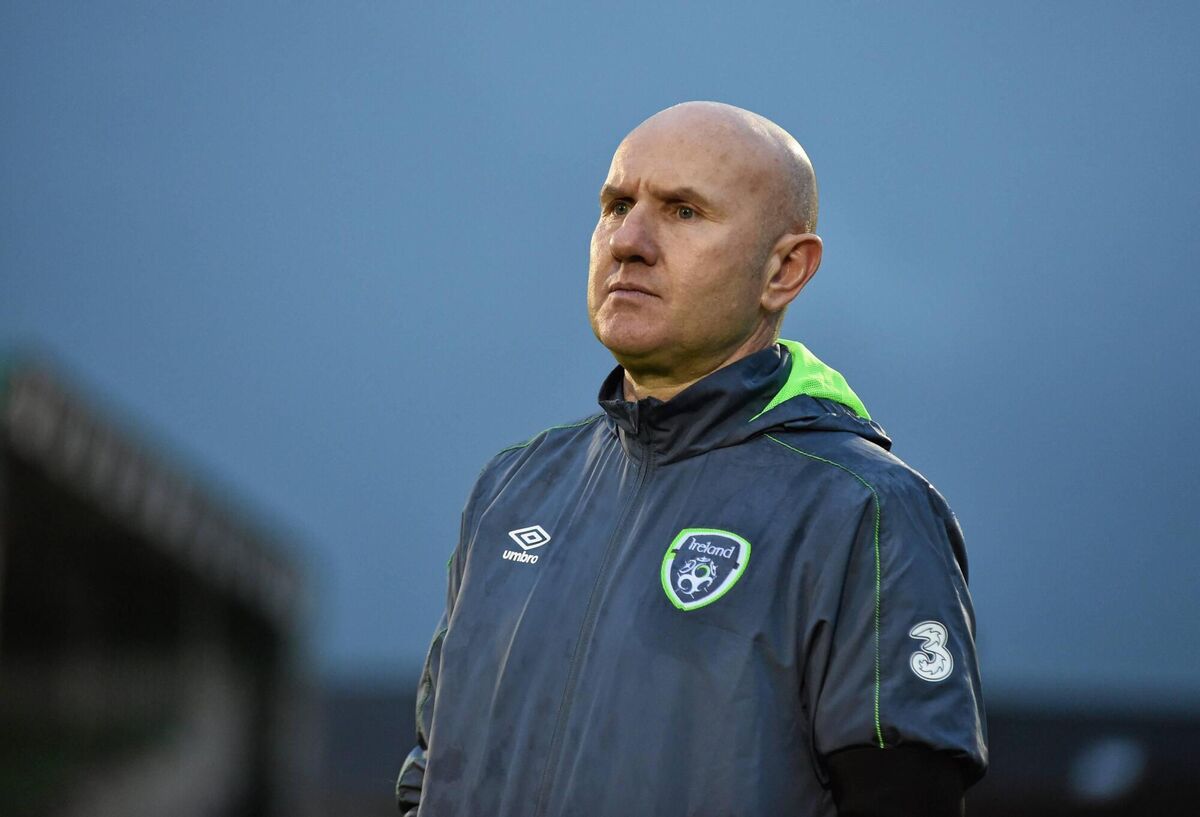
The Northern Ireland outfit were just one of the clubs Dooley graced during his playing career, winning the double in 1991, and they’ve turned to their former hero to try get them out of trouble.
His sole task in the short-term contact is to extract Ports from the relegation play-off spot they occupy, the type of rescue mission he’s previously perfected.
Once considered the rising star of the coaching circuit after spearheading Drogheda United’s revival and leading Ireland to the U19 Euro semi-finals, instead Doolin went 12 years without a management post. First Division Athlone Town last year supplied him with an eventual comeback but after shocking Galway United in his first match and finishing the season respectively, he turned down a contract extension.
Doolin has always acted on instinct, like quitting Cork City over off-field strife despite finishing his sole season in 2009 in third place, and he’ll apply the same principles at Shamrock Park.
“I tell the truth, which isn’t always great for your career,” he said last year. We’ll watch on with interest, envious that he’s no longer on our own beat.
- john.fallon@examiner.ie

